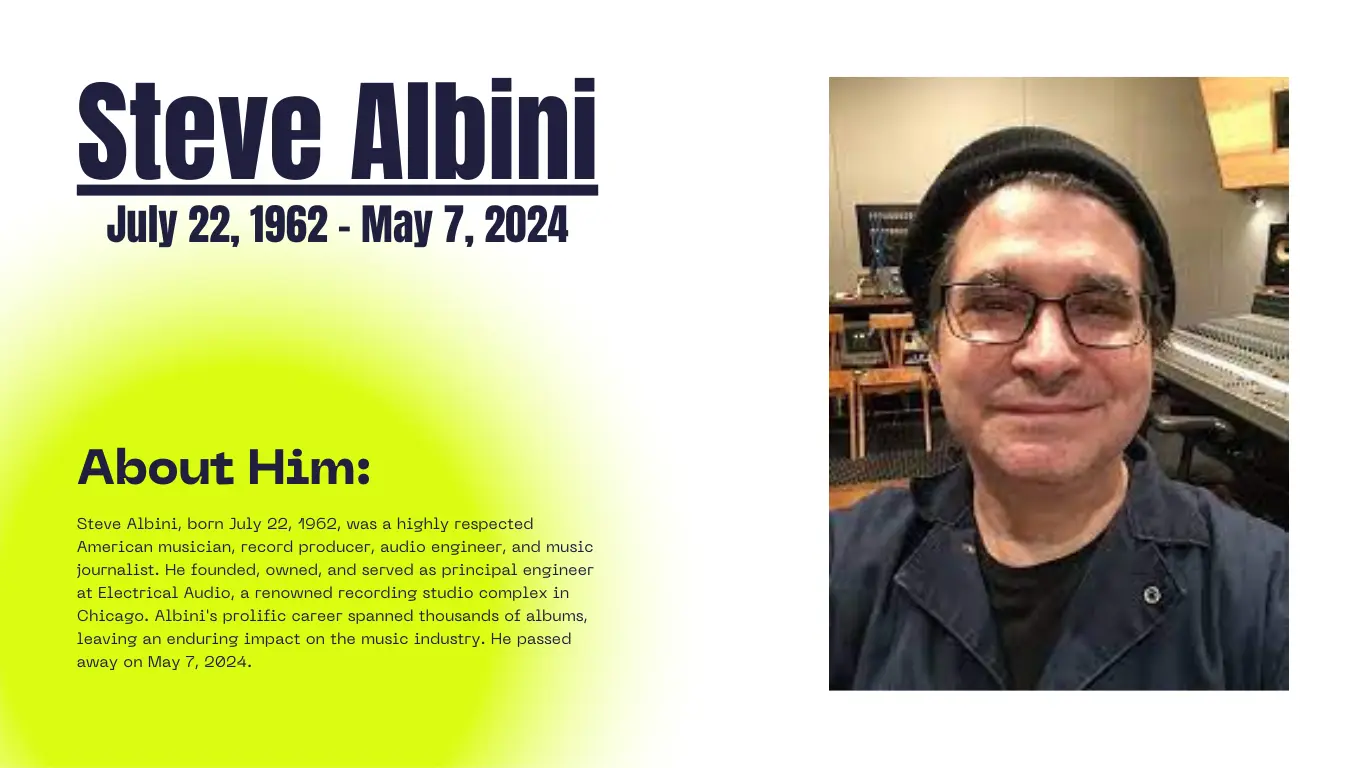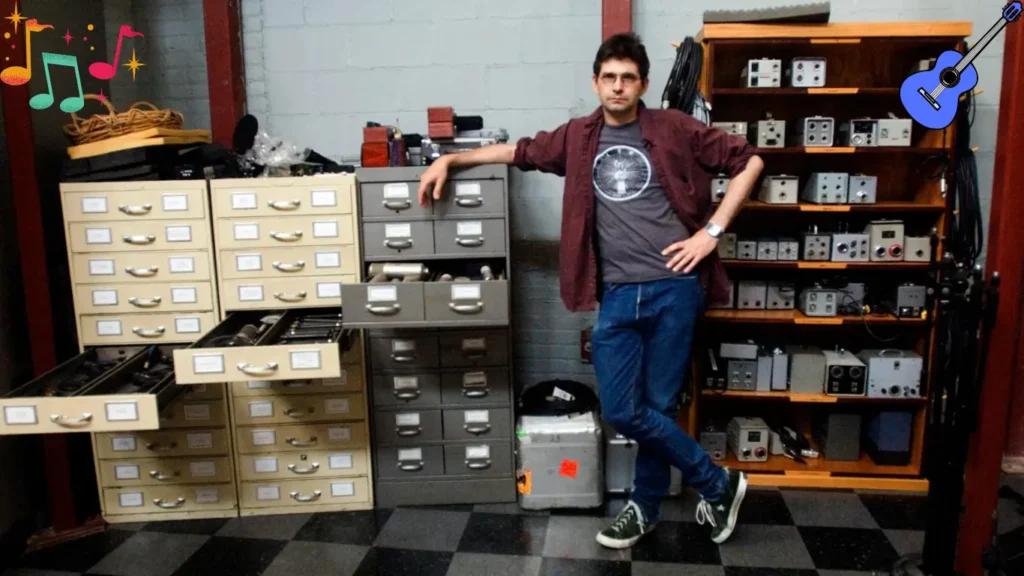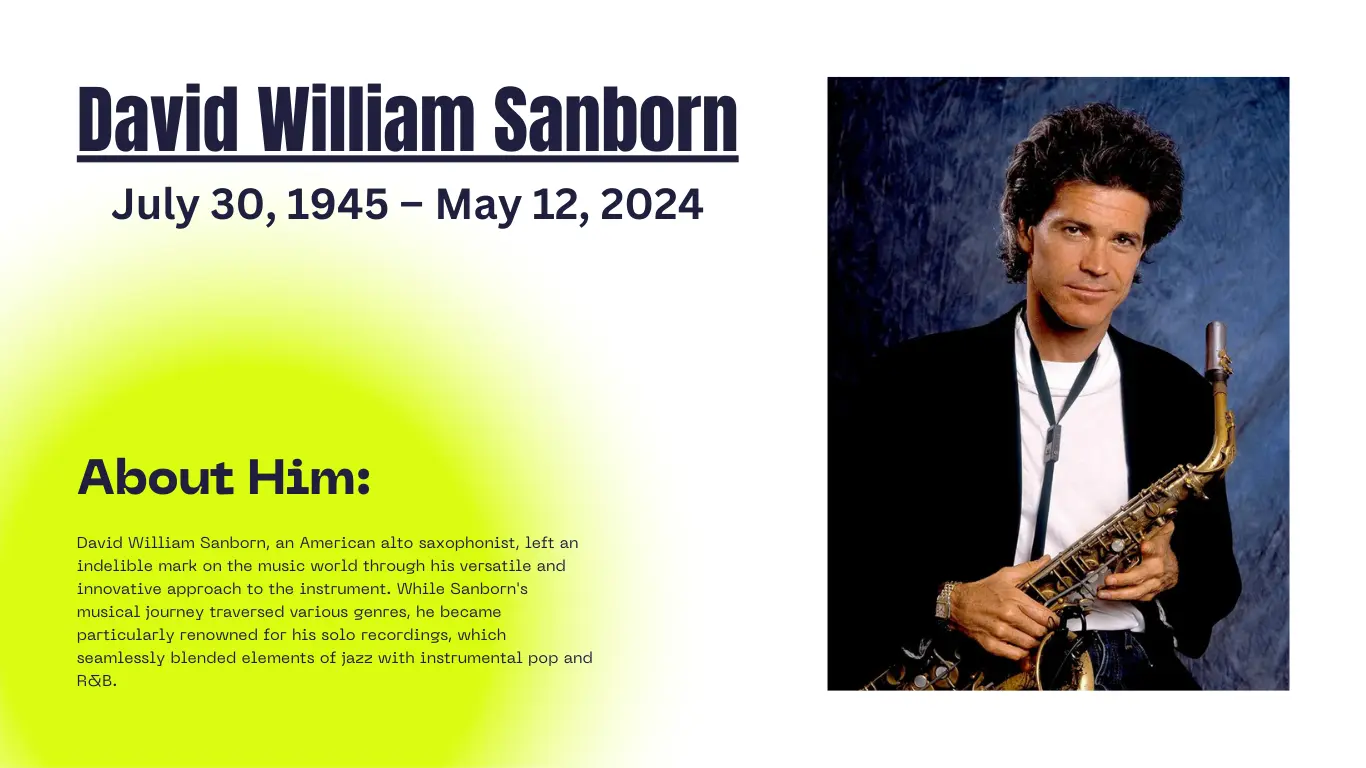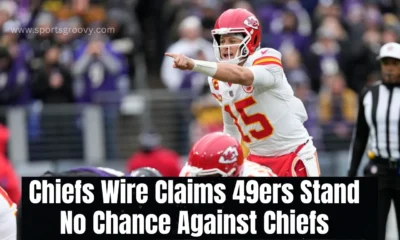Celebrity
Steve Albini American musician died at age of 61

Steve Albini, a talented musician, guitarist, and producer, known for his work in the US alternative music scene, has passed away at the age of 61. He suffered a heart attack at his recording studio, Electrical Audio, where he spent much of his time crafting music. The sad news confirmed by staff at his studio and shared by Pitchfork, a prominent music publication.
On the other hand, a celebrity welcomed a baby in her family.
Albini was not only a frontman for bands like Big Black, Rapeman, and Shellac, but also a renowned producer who left an indelible mark on the industry. His musical ventures often explored the edges of post-punk and art-rock, pushing boundaries and challenging norms.
Steve Albini, the influential figure in the music world, shared his life with film director Heather Whinna in Chicago. Despite his accomplishments, he bore a slight deformity in his right leg due to a car accident he had at 18.

In terms of media consumption, Albini wasn’t particularly keen, except for one guilty pleasure: cat videos on YouTube. He steered clear of feature films, preferring other pastimes.
Albini was candid about his beliefs, openly stating his atheism in a 2011 interview.
Additionally, he made a conscious decision to abstain from drugs and alcohol. His choice stemmed from personal experience, as he witnessed his father’s struggles with alcoholism, which made him acutely aware of the dangers of addiction. This decision reflected his commitment to living a sober and healthy lifestyle.
During his teenage years, Steve Albini involved with various bands like Just Ducky from Montana. Which Small Irregular Pieces of Aluminum, and Stations, among others. There was another band he was part of that Touch and Go/Quarterstick Records mentioned but didn’t reveal, implying a secretive past.
After finishing high school at Hellgate High School, Albini headed to Evanston, Illinois, to study journalism at Northwestern University’s Medill School. He earned his degree there, but his true passion lay in painting, which he pursued under the guidance of the esteemed educator Ed Paschke, whom he greatly admired.
While in Chicago, Albini immersed himself in the local punk scene, writing for zines like Matter and Forced Exposure. His articles known for their rebellious spirit. Around the same time, he started recording musicians and engineered his first album in 1981.
Albini was also involved in managing Ruthless Records in Chicago. Alongside John Kezdy from the Effigies and Jon Babbin from Criminal IQ Records. Despite his musical pursuits, Albini held down a “straight job” for five years until 1987. His working as a photograph retouch artist in a photography studio.
Steve Albini’s Music Career:
1981 – 1987: Big Black:
In 1981, Steve Albini formed Big Black while studying at NU. Their debut EP, “Lungs,” was recorded on Ruthless Records, a label he co-managed. Albini played most instruments on “Lungs,” with friend John Bohnen on saxophone. Their EP “The Bulldozer” came out in 1983 on Ruthless and Fever Records.
Members from Naked Raygun joined, and they released “Racer-X” in 1984. Which followed by their debut album, “Atomizer,” in 1986 with Dave Riley on bass. They compiled “The Hammer Party” with their earlier EPs. Moving to Touch and Go Records, they released “Headache” and “Heartbeat” in 1987. Their influences included Ramones, The Stooges, and many others.
In 1987, they released their second studio album, “Songs About Fucking,” and a single. “He’s a Whore / The Model,” on Touch and Go. Big Black disbanded after extensive touring, with Santiago Durango pursuing law school.
1987 – 1988: Rapeman:
In 1987, Steve Albini formed Rapeman, a band comprising himself on vocals and guitar, Rey Washam on drums, and David Wm. Sims on bass. Washam and Sims had previously been part of Scratch Acid. The band took its name from a Japanese comic book.
Rapeman released two 7-inch singles: “Hated Chinee b/w Marmoset” in 1988 and “Inki’s Butt Crack b/w Song Number One” in 1989. They also put out an EP titled “Budd” in 1988 and the album “Two Nuns and a Pack Mule” in the same year, all under the Touch and Go label.
In a 2020 interview, Albini expressed regret for the band’s name, admitting he hadn’t faced criticism for being in a band called Rapeman. He acknowledged the name was a thoughtless choice and likened it to getting a bad tattoo, finding it indefensible.
1992 – 2024: Shellac:
In 1992, Steve Albini formed Shellac alongside Bob Weston, formerly of Volcano Suns, and Todd Trainer. Which known from bands like Rifle Sport, Breaking Circus, and Brick Layer Cake. Their journey began with three EPs. “The Rude Gesture: A Pictorial History” (1993), “Uranus” (1993), and “The Bird Is the Most Popular Finger” (1994). The first two EPs were under Touch and Go, while the third was released by Drag City.
Just two years after their formation, a live album exclusive to Japan, “Live in Tokyo,” released by the Japanese label NUX Organization. This was followed by five studio albums. “At Action Park” (1994), “Terraform” (1998), “1000 Hurts” (2000), “Excellent Italian Greyhound” (2007), and “Dude Incredible” (2014). Notably, all of Shellac’s studio albums were available on both vinyl and CD.
Sadly, Albini passed away on May 7, 2024, just a week before the scheduled release of Shellac’s “To All Trains.” Which leaving behind a remarkable legacy in the world of alternative music.
Musical Influences, Shaping Sounds and Styles:
Steve Albini really loves the sound of a great guitar. He once compared the feeling of hearing awesome guitar noise to having an orgasm. He believes that simply playing notes on a guitar is easy for anyone. But the real skill lies in making the guitar sound totally unexpected, like it’s not even a guitar anymore. He admires guitarists who push the limits and create unique sounds.

Some of his favorites include Andy Gill from Gang of Four, Rowland S. Howard from Birthday Party, and John McKay from Siouxsie and the Banshees. He also praises Keith Levene from Public Image Ltd, Steve Diggle and Pete Shelley from Buzzcocks. And Ron Asheton from the Stooges for their innovative guitar work.
Albini also has high regard for Paul Fox from the Ruts, Greg Ginn from Black Flag, Lyle Preslar from Minor Threat. John McGeoch from Magazine and the Banshees, and Tom Verlaine from Television. These guitarists inspire him because they stretch the boundaries and create music that’s truly unique and groundbreaking.
Steve Albini really admires the way Andy Gill plays guitar on Gang of Four’s album “Entertainment.” He thinks Gill can make the six strings of his guitar produce incredibly beautiful yet raw noise unlike anyone else.
Albini also praises John McKay’s guitar work on Siouxsie and the Banshees’ album “The Scream.” He believes McKay created a unique sound that people are still trying to imitate today. But nobody quite understands how he made all that chaotic noise fit together into songs. Albini also gives credit to Ron Asheton for his ability to create intense. By squealing feedback on the guitar, describing it as “great squealy death noise.”
When it comes to John McGeoch’s guitar playing, Albini admires the way he can create big. By sweeping sounds as well as scratchy, buzzing noises and dissonant tones. Lastly, Albini is impressed by Tom Verlaine’s versatility on the guitar. Which is noting his ability to produce all sorts of different sounds from the instrument.
Music Industry and it’s Production:
In “The Problem with Music,” Steve Albini didn’t hold back in criticizing the music industry, especially major record labels. He argued that these labels were taking advantage of musicians financially and being deceptive about it.
In the essay, he broke down the finances to show how a band selling 250,000 copies of their debut album through a major label would end up with very little money in their pockets, even less than what they’d earn working at a regular job like a 7-11. Albini highlighted how the label’s expenses ate up most of the revenue from album sales, leaving the artists with just a fraction of what they should rightfully earn. He continued to stand by this viewpoint in a presentation at Middle Tennessee State University in 2004.

In November 2014, Steve Albini took the stage at the Face the Music conference in Melbourne, Australia, where he talked about how the music scene and industry have changed since he first started making music in the late 1970s.
He painted a vivid picture of the music industry before the internet, describing it as a system that was designed to waste money by rewarding extravagant spending. This system, he argued, made it difficult for most bands to earn a living, except for the very top stars. In contrast, Albini highlighted the independent music scene, which promoted resourcefulness and efficiency.
This scene relied on a network of clubs, promoters, fanzines, DJs, and labels outside of the corporate music industry. Because of this alternative system, musicians had a better chance of making a reasonable income.
Steve Albini was a big fan of analog recording, and he made sure everyone knew it. In the liner notes of his bands’ albums, he would list all the equipment he used for recording and engineering. He didn’t hold back his feelings about digital recording either.
On the back cover of the CD version of Big Black’s album “Songs About Fucking” in 1987, he straight up slammed digital, declaring, “The future belongs to the analog loyalists. Fuck digital.” He stuck to his guns on this, even in a 2013 interview where he expressed concerns about using digital files as audio masters. He worried that these files could be mishandled or purposely thrown away, emphasizing the risks of relying solely on digital technology for music production.
In his essay “The Problem with Music,” which first appeared in The Baffler in December 1993, Steve Albini didn’t hold back his criticisms of certain recording practices. He didn’t like how some producers and engineers would use a lot of equalizers and compression, which he felt made music sound generic, like it belonged in a beer commercial.
Albini also took aim at those who boosted the volume of vocals just to mimic the sound of popular bands like the Beatles, catering more to commercial interests than artistic integrity. He found it frustrating when people in the industry used vague terms like “punchy” or “warm” to describe sound, feeling like it lacked substance.
In a 2018 interview, Albini reflected on these criticisms, noting that over the past 25 years, record labels had lost much of their influence, resulting in fewer producers solely focused on exerting artistic control over recordings.
On the other hand, he acknowledged that digital recording technology had opened up opportunities for more people to become audio engineers, giving them the freedom to work productively in the industry.
Works or publications by Steve Albini:
- “Husker Du? Only Their Hairdresser Knows for Sure” Article for Matter on Hüsker Dü, published September 1983.
- “I would like to be paid like a plumber” Letter written by Steve Albini to Nirvana in 1992, outlining his working philosophy.
- “Ask a music scene micro celebrity” Steve Albini answers questions about bands and music on a poker forum, The 2+2 Forums, July 7, 2007. Archived from the original on April 17, 2010.
- “I am Steve Albini, ask me anything” reddit IAmA, May 8, 2012; accessed June 21, 2015.
- “Steve Albini talks to LISTEN: ‘I try to be an ally in feminism’” Interview in LISTEN, May 2, 2016; accessed August 16, 2016.
-

 Soccer4 months ago
Soccer4 months agoDutch Fans in Blackface to Imitate Ruud Gullit, One Agrees to Stop
-

 Soccer4 months ago
Soccer4 months agoEx Glamour Model Says Party with England Team Before Euros
-

 Soccer4 months ago
Soccer4 months agoArgentina vs Peru 2-0 Highlights & All Goals Copa America 2024
-

 News6 months ago
News6 months agoDubai Flood, Rain Turns Desert to Aquarium🌧️🐠
-

 NBA4 months ago
NBA4 months agoCelebrate with the Boston Celtics: Parade and Traffic Updates
-

 Soccer4 months ago
Soccer4 months agoUEFA EURO 2024: Essential Guide and Key Information
-

 Celebrity5 months ago
Celebrity5 months agoDavid Sanborn, American Alto Saxophonist, Died at Age 78
-

 Entertainment5 months ago
Entertainment5 months agoNorthern Lights Again Return near California-Oregon Border This Saturday
















Pingback: Real Madrid 's Epic Comeback Shocks Bayern, Secures Champions League Final Spot - Sports Groovy
Pingback: Quant King Jim Simons Dies At Age of 86 - Sports Groovy
Pingback: American Film Director & Actor Roger Corman Passes Away at 98 - Sports Groovy